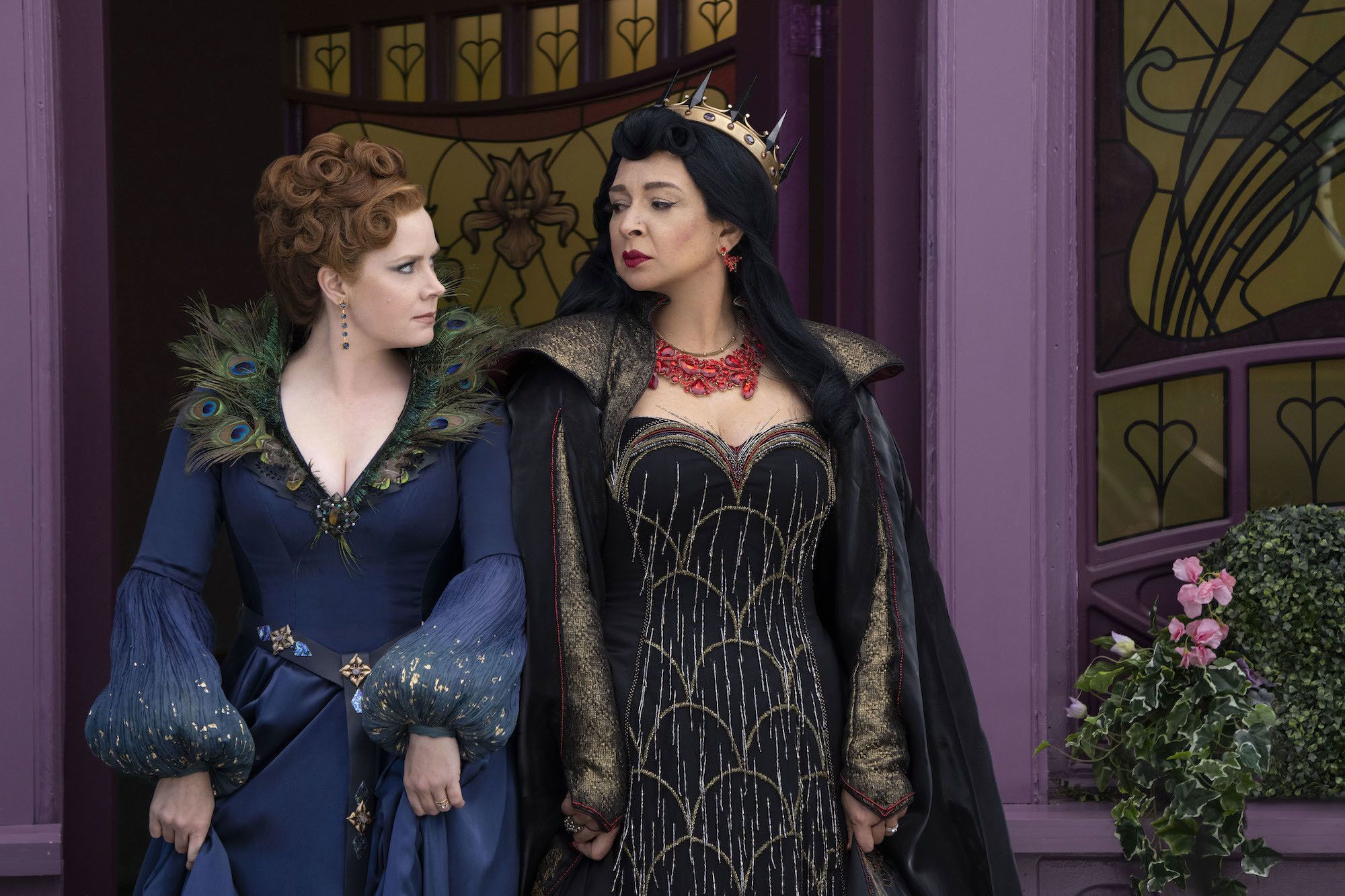Disenchanted Review: Amy Adams Is the Only Light in This Lackluster Fairytale
It's alright - we'll always have the first movie

Released in 2007, Disney’s Enchanted is a modern classic if ever there was one—a beloved twist on the typical Disney format that introduced an entire generation to the brilliance of Amy Adams. Fifteen years after the original film swept audiences off their feet, Disney is returning once again to Andalasia with Disenchanted, the long-awaited sequel.
Though the film does manage to wrangle most of the cast and creative team from the original, there simply isn’t enough magic in Disenchanted to rekindle (or even come near) the joyous charm of the first film—leading to a lackluster sequel that’s equal parts underwritten and unoriginal.
Starring Amy Adams and Maya Rudolph, Disenchanted picks up years after Princess Giselle (Adams) found her happy ending with the tightly-wound but good-hearted lawyer Robert (Patrick Dempsey). Despite a loving marriage and a growing bond with her step-daughter Morgan (Gabriella Baldacchino), Giselle is unhappy with life and New York, and moves their family to the suburbs in search of a new start. But when her discontent only grows, a good-intentioned spell spirals out of control, and soon Giselle finds herself the villain of a new story that she must race to erase before it’s too late.
Speaking purely conceptually, Disenchanted‘s narrative is an interesting reflection on the first film’s themes, and an ambitious concept to tackle in a Disney film—a direct acknowledgment of the non-existence of a ‘happy ending’. The first Enchanted film mostly uses the dichotomy of Giselle’s expectations about the world for comedic purposes, but the underlying dramatic current was always that Giselle’s sheltered upbringing underprepared her for the harsh realities of ‘real life’.
Disenchanted explores this idea head-on, making it very clear from the get-go that, despite being in love with Robert and caring deeply about Morgan, even her feelings for them aren’t enough to help her adjust to a non-fairytale life. It’s remarkably bleak: especially considering the light it casts the end of the first film in, but a commendable concept for a sequel that fully embraces the muddier parts of an otherwise squeaky-clean narrative.
Where Disenchanted flounders, though, is in the execution. The concept of Giselle being unsure of how to find joy or fit in with the real world is a fascinating one, but the script refuses to examine its own premise in any meaningful detail, and instead the shallow, surface-level ruminations feel half-hearted, simply an afterthought to give Giselle a reason to turn evil.
And turn evil she certainly does in another bold choice. The decision to have Giselle slowly morph into an ‘evil step-mother’ while everyone around her is sucked into a twisted fairytale is a clever subversion of the first film, certainly, but yet again a strong concept is bogged down by an unsophisticated script that merely pokes at the bare bones of an idea instead of expanding on them.
Despite the fact that both Morgan and Robert’s relationships with Giselle are crucial to the film’s emotional and narrative core, Robert is severely underwritten and Morgan spends far too long as a fairytale cliche after Giselle’s wish is accidentally granted. Thus, with both of the most compelling characters written out of the way, Giselle instead spends most of the film engaging in meaningless and repetitive clashes with Maya Rudolph’s Malvina Monroe, the town queen bee/evil queen of the fairytale.

Though it’s certainly understandable wanting to feature a talent like Rudolph, Malvina’s character feels wholly unnecessary when the narrative of Giselle turning evil is certainly fair enough. Not only that, but Malvina’s presence almost always comes at the expense of another, more interesting character—in addition to the aforementioned Morgan and Robert, James Marsden’s Prince Edward and Idina Menzel’s Nancy are particular victims of this phenomenon.
While Amy Adams will always be the most iconic performance in Enchanted, James Marsden’s Prince Edward is an equally (thought certainly not as celebrated) performance that’s revived to great success in Disenchanted—but the film hardly seems interested in showcasing one of the few characters it actually has going for it. Marsden’s sheer presence makes any scene better, and Menzel’s vocal chops are impressive enough to carry the most tired of original songs—but for whatever reason, they’re shoved aside in favor of spending more time with Malvina.
As mentioned, though, there’s one saving grace in this sour sequel: Amy Adams pulling double duty as the goody-two-shoes Giselle and the wicked stepmother persona that’s slowly taking over her. The physical comedy and sheer camp that Adams is pumping into this performance is almost reminiscent of Jim Carrey in The Mask—the energy is always at 1000%, and her zealous commitment to the bit singlehandedly makes even the banalest of dialogue watchable.
When it comes to being a suitable spiritual successor to a well-loved Disney favorite, Disenchanted is unfortunately a failure—struggling to recapture the charm of the original and putting too much stock in original songs, theatrical antics, and recognizable talent. Though Amy Adams and James Marsden are pitch-perfect, even the combined power of their performances isn’t enough to make Disenchanted a worthy sequel.
(featured image: Disney)
Have a tip we should know? [email protected]